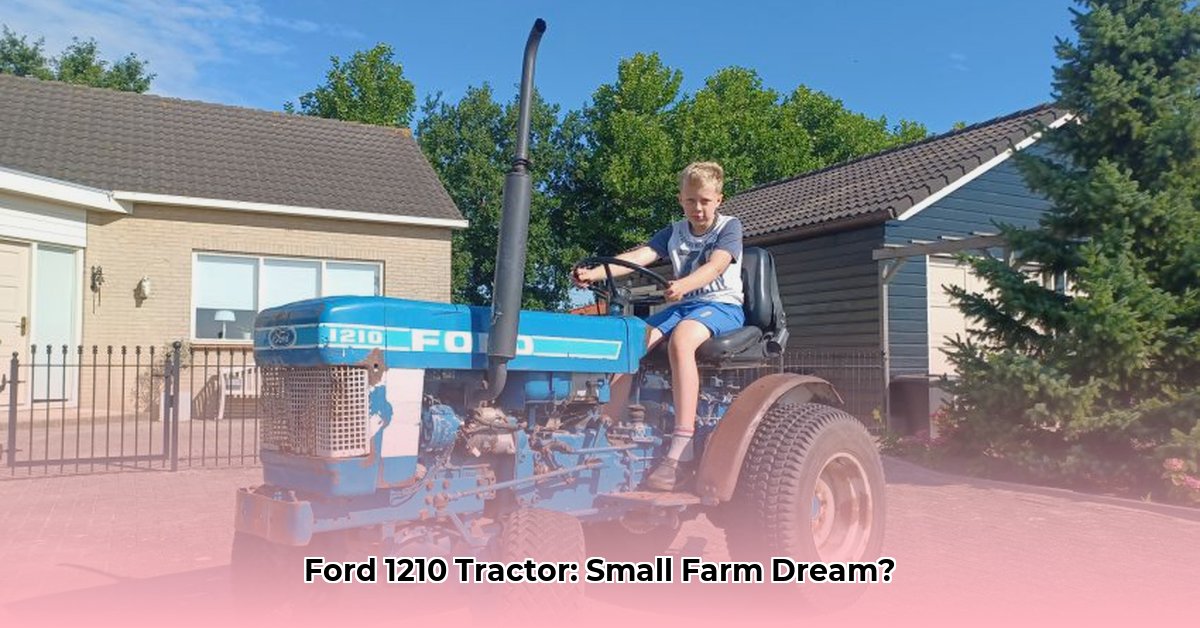
The Ford 1210 tractor: a compact powerhouse with a rich history. While not the latest model on the market, this sturdy machine remains a compelling option for small-scale farmers and enthusiasts interested in sustainable agriculture. Built by Shibaura and marketed under the Ford name, the 1210 offers a blend of simplicity, efficiency, and surprising versatility. For more on classic Ford tractors, check out this helpful resource: Ford tractor specs. Let's delve into its specifications and assess its suitability for modern farming practices.
Power and Performance: The Ford 1210's Capabilities
The Ford 1210 boasts a hardworking 3-cylinder diesel engine, delivering approximately 16 horsepower. While this might seem modest compared to today's high-powered tractors, it's important to remember the context. The 1210 was designed for smaller farms and properties, prioritizing maneuverability and efficiency over raw power. Its compact size makes it ideal for navigating tight spaces and performing diverse tasks. Isn't a nimble workhorse preferable to a lumbering giant in a small-scale setting?
The 10-speed transmission provides precise speed control, adapting to various field conditions. This feature alone makes it remarkably capable for a tractor of its era. While some sources mention a 4-wheel drive option, the availability remains somewhat unclear and requires further investigation.
Versatility: Expanding the Ford 1210's Uses
A key strength of the 1210 lies in its adaptability. Its design allows for a wide range of attachments, transforming it into a versatile tool for various farm tasks. From mowing and snow removal to loading and even light digging, the 1210 proves its mettle. This versatility is crucial for sustainable farming, minimizing resource consumption and reducing the need for specialized equipment. It emphasizes doing more with less—a core tenant of sustainable agriculture.
Fuel Efficiency: A Sustainable Advantage
The 1210's compact design and modest power requirements contribute to remarkable fuel efficiency. Its 4.8-gallon fuel tank is a testament to its economical nature. While precise fuel consumption data may be scarce, its overall design prioritizes efficiency, a crucial element in sustainable farming practices. How does its fuel efficiency compare to modern compact tractors? A comparative analysis would undoubtedly reveal fascinating insights into technological advancement in the sector.
Ford 1210 Tractor Specs: A Quick Overview
Here's a summary of the key specifications:
| Specification | Value | Notes |
|---|---|---|
| Engine | 3-cylinder Diesel | Manufactured by Shibaura |
| Horsepower | Approximately 16 hp | This can vary slightly depending on measurement methods |
| Transmission | 10-speed | Excellent for precise speed control in different conditions |
| Fuel Tank Capacity | 4.8 gallons | Suggests significant fuel efficiency |
| Common Attachments | Mower, loader, snowblower, etc. | Versatility is a major advantage |
| Drive Type | Primarily 2WD; 4WD possibly available | Reports on 4WD availability are inconsistent |
The Ford 1210 Today: A Sustainable Choice?
Should you consider a Ford 1210 for your farm? The answer depends on your specific needs. Its fuel efficiency and adaptability are undeniable strengths. However, its limited power compared to modern tractors and the absence of advanced features must be considered. But for hobby farmers or those with smaller properties, its affordability, ease of maintenance, and simple design might make it an unexpectedly suitable choice.
More Than Just Specs: A Legacy of Sustainable Practice
The Ford 1210 represents a bygone era in agricultural machinery, prioritizing simplicity and efficiency. Its design embodies the spirit of sustainable farming, even predating the widespread adoption of such practices. Its continued popularity amongst collectors and enthusiasts speaks volumes about its enduring appeal and robust design. This little tractor is a testament to elegant, cost-effective engineering and its design principles serve as valuable lessons in modern sustainable agriculture.
Comparing the Ford 1210's Fuel Efficiency to Modern Compact Tractors
The Ford 1210 presents a unique opportunity to explore the evolution of agricultural technology. How does its fuel consumption compare to modern compact tractors? Let's examine the factors involved.
Understanding the Ford 1210's Fuel Economy
Precise fuel consumption figures for the Ford 1210 are difficult to obtain. Manufacturer data from that era often lacks the precision of modern specifications. Engine condition, terrain, and operational practices heavily influence fuel usage. The absence of sophisticated monitoring systems further complicates accurate measurement. Therefore, any comparison is inherently approximate.
Key factors affecting the 1210's fuel economy include engine size and type, operational practices, and maintenance.
Comparing to Modern Compact Tractors
Modern compact tractors showcase significant advancements in fuel efficiency, primarily due to advanced engine technologies, improved transmissions (such as CVTs), and sophisticated electronic controls.
Methods for Indirect Comparison
Direct comparison is challenging due to the limitations described above. However, workable indirect methods include estimating work output for a given task, consulting manufacturer specifications for modern tractors, and reviewing user reviews and forum discussions.
Sustainable Implications
Fuel efficiency is paramount for sustainable farming. Lower fuel consumption translates to reduced operating costs and a smaller carbon footprint. While precise comparison between the Ford 1210 and modern compact tractors is difficult, understanding the key factors allows for a meaningful, if imprecise, assessment.
Key Takeaways:
- The Ford 1210, while a durable machine, wouldn't match the fuel efficiency of modern compact tractors.
- Modern advancements in engine technology and transmission systems dramatically improve fuel economy.
- Indirect comparison methods, utilizing work output estimates and manufacturer data, are essential for a reasonable assessment.
- Fuel efficiency remains a critical aspect of sustainable small-scale farming.